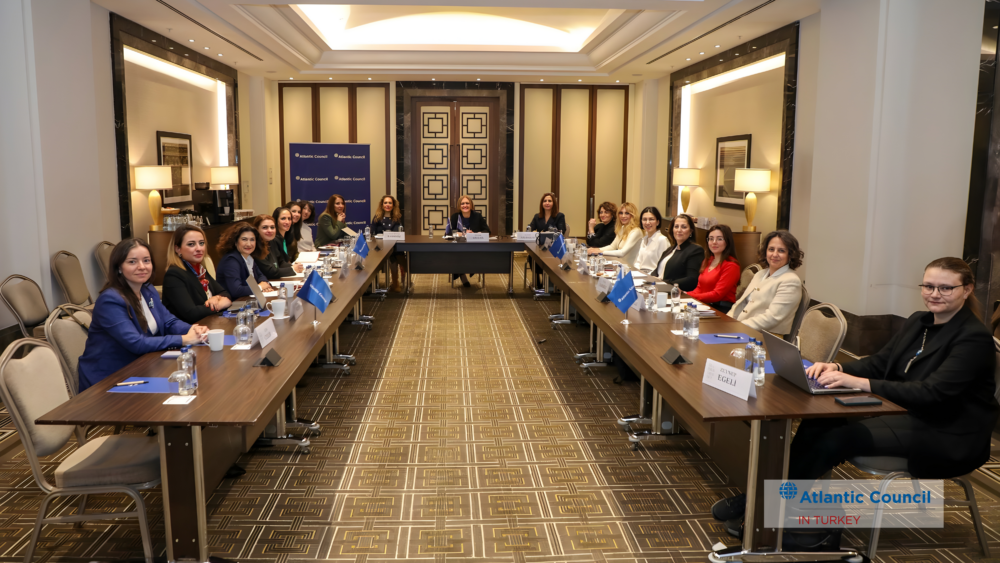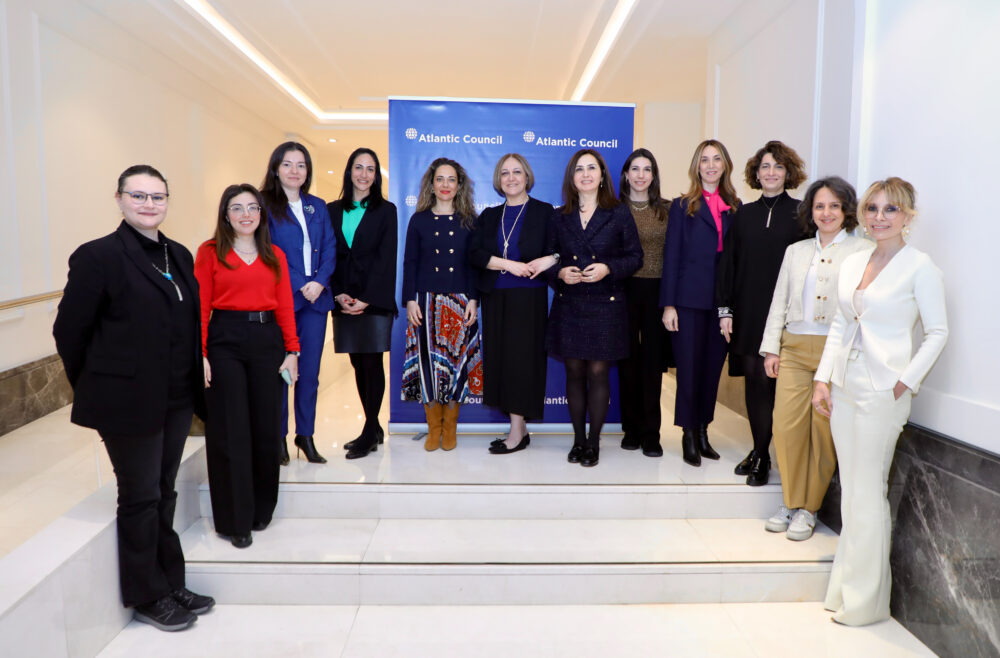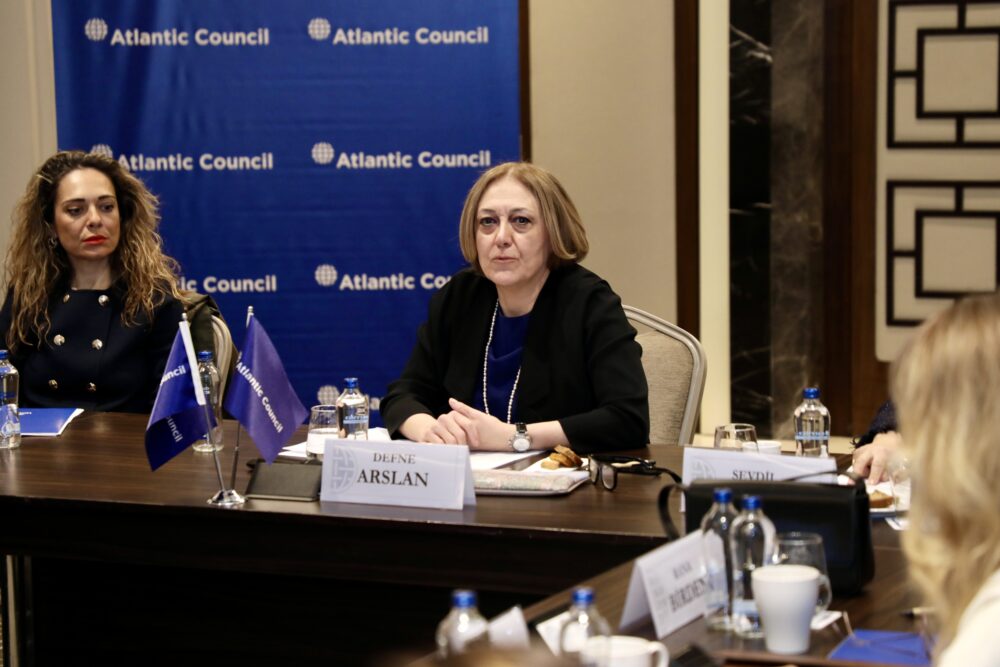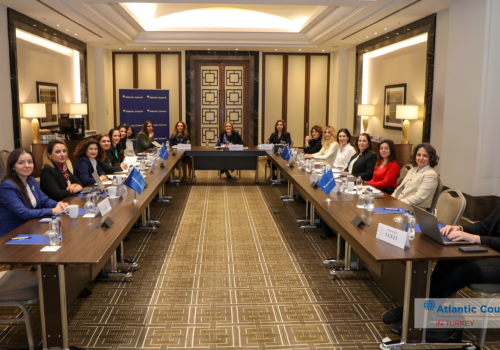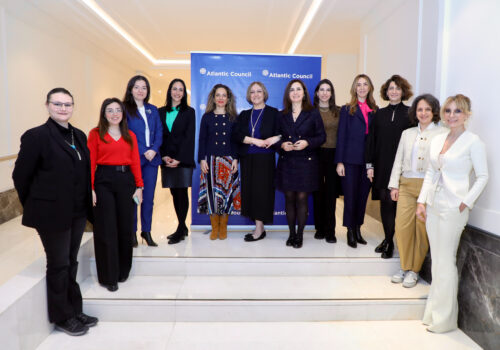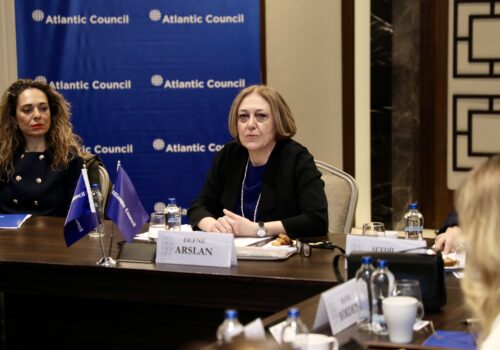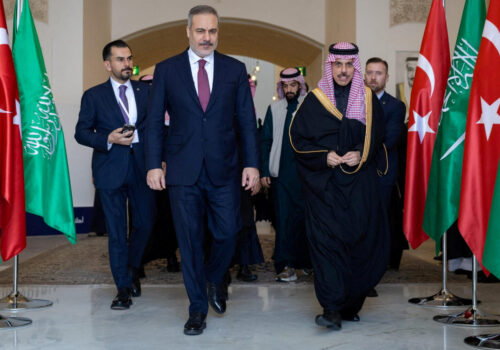The initial months of 2025 have shown just how complicated geopolitics has become—and how Turkey will need to navigate this era carefully.
As Turkey navigates a shifting global order, economic transformations, and regional conflicts, considering diverse perspectives from informed, visionary leaders—including women—will be crucial.
On March 6, the Atlantic Council Turkey Programs hosted a private roundtable to honor women’s leadership in Turkey in the days leading up to International Women’s Day. The event brought together women thought leaders, diplomats, and heads of businesses in Turkey to discuss global and regional developments, focusing on effective solutions to current challenges. These powerful women spoke under Chatham House Rule about their experiences navigating an increasingly complex world, and specifically about Turkey’s relations with the United States and European Union (EU), Turkey’s role in NATO and the Middle East, and the future of the Turkish economy.
US-Turkey relations amid a changing international order
Participants agreed that US President Donald Trump’s return to office has significantly altered the international order. Given its strategic geopolitical position, Turkey plays a key role in this shifting landscape, which presents Ankara with both challenges and opportunities, the participants said. Concerns were raised regarding the United States losing its status as a diplomatic reference point due to sudden foreign policy changes. Participants emphasized Turkey’s potential to become a full-fledged regional leader but warned against indecisiveness, drawing parallels to the start of the Syrian civil war in 2011, when some felt Turkey missed an opportunity to strengthen ties with the EU through its response to the migrant crisis.
Turkey’s increasing significance in the Middle East
Speakers emphasized Ankara’s evolving role in the Middle East and beyond. For example, as some participants pointed out, Turkey has managed to strengthen ties with Gulf nations while looking beyond their historical disagreements. One participant noted that Turkey has shifted from direct competition with Gulf states to a more utilitarian strategy, improving diplomatic relations across the region. Turkey’s position on Israel and regional security was also debated, with participants mentioning concerns over rising tensions since Hamas’s October 7, 2023 terrorist attacks on Israel. Additionally, Turkey’s influence in shaping the future of Syria was a critical point of discussion. Participants agreed on the difficulty of maintaining sway over the Damascus government without jeopardizing Syria’s legitimacy as an independent state.
EU-Turkey defense relations and implications for NATO
Participants welcomed signs of a more constructive EU-Turkey relationship in light of developments in Syria, cooperation in Ukraine, and the recent discussions of joint defense initiatives. However, skepticism remained regarding whether these bilateral ties can translate into broader EU-wide support for Turkey. The conversation highlighted Turkey’s strong relationships with key European nations such as Spain and Italy and also addressed the failure to leverage these relationships for more extensive regional backing. Some criticized the EU’s reluctance to deepen ties with Turkey due to Turkey’s historical tensions with France and Greece, urging Europe to recognize Turkey as an indispensable ally due to its military, geographic, and economic significance.
One participant underscored the necessity of rethinking NATO’s framework to better integrate Turkey’s interests and security concerns while addressing broader tensions between global powers. The participant reminded the roundtable that Turkey has historically been a bridge between the East and the West, and this role has only become more significant as global tensions rise. She said that Turkey has actively engaged with both Western allies and Russia, seeking to maintain a delicate balance in its foreign policy.
Turkey’s role in the new Syria
In discussing the future of Syrian refugees in Turkey, which currently hosts 3.1 million Syrians under temporary protection, participants noted how many Syrian immigrants have had opportunities in Turkey to establish their own businesses. This echoed the stories presented to the roundtable in a screening of an excerpt from the Atlantic Council Turkey Programs’ documentary, Do Seagulls Migrate?, which explores the experiences of four Syrian women refugees in Turkey.
Some speakers noted the social tensions prevalent in refugee-dense regions such as Kilis and neighborhoods in Istanbul, where the large influx of refugees has contributed to rising rents, decreased job availability, and strains on infrastructure. The discussion acknowledged that while refugees have played a significant role in certain sectors of the economy, the rapid demographic changes have also led to challenges for local populations. The women leaders emphasized the need for holistic policies to address these challenges.
Beyond economic repercussions, participants expressed caution regarding the leadership of Hayat Tahrir al-Sham, given its former ties to al-Qaeda, and acknowledged the apprehension many Syrian immigrants—especially women—feel about returning to an uncertain and potentially dangerous environment. The women leaders also raised concerns about long-term integration challenges; while many refugees have settled in Turkey and are unlikely to return to Syria, the refugees’ repatriation remains a key talking point for politicians. The discussion also highlighted the growing presence of a new generation of Syrian children raised in Turkey, underscoring the need to consider their future role and representation within Turkey’s democracy.
Trade, tariffs, and the economy
Several speakers noted that Turkey’s economic trajectory remains closely tied to Europe. One of the most critical concerns raised was the impact of US tariffs and sanctions, which can add to the pressure on Turkey’s economy. Additionally, the participants noted, new EU environmental regulations such as the Carbon Border Adjustment Mechanism could further strain Turkish exports. However, there was also a sense of cautious optimism, with some speakers pointing to the potential for increased trade volume between Turkey and the United States; in 2024, that trade volume was $32 billion. The participants argued that in the face of global economic shifts, Turkey’s ability to maintain a balanced foreign policy will be essential for safeguarding its economic stability and fostering long-term growth. Striking a careful equilibrium between the United States and Europe—and between these Western allies and regional partners—will be key in mitigating economic uncertainties and capitalizing on new trade opportunities, the participants added.
Investing in Turkey’s human capital
Speakers noted that Turkey has a strong private sector capable of cutting-edge innovation. However, they added that if Turkey wants to maintain and strengthen its relevance in an increasingly competitive global market dependent on new technologies, it should focus on developing a highly skilled workforce. Therefore, speakers at the roundtable extensively discussed the need for aligning educational initiatives with labor market demands, particularly in sectors such as digital innovation, renewable energy, and advanced manufacturing. Speakers noted that university partnerships and investments in vocational training will be crucial in ensuring the continuous development of Turkish human capital. On the other hand, concerns were also raised about the impact of brain drain on Turkey’s innovation potential, with many young professionals seeking opportunities abroad. As one speaker put it, Turkey must focus on developing a highly skilled workforce to maintain its economic relevance in an increasingly competitive global market.
Photos from the roundtable
Zeynep Egeli is the project assistant of the Atlantic Council Turkey Programs.
Further reading
Tue, Mar 25, 2025
How Germany’s incoming government will work with Turkey
TURKEYSource By
A stronger German focus on national interests, security, and leading the EU may reshape Germany-Turkey relations to be more transactional in the years ahead.
Thu, Feb 20, 2025
Syria’s rebuilding is bringing US partners Turkey and Saudi Arabia closer together
TURKEYSource By Pınar Dost
Relations between Turkey and Saudi Arabia are deepening, opening up new possibilities and implications for the region.
Mon, Mar 3, 2025
The impact of the PKK leader’s call to disarm will depend on how regional power balances unfold
TURKEYSource By
Whether this is truly the beginning of a historic resolution on the Kurdish question will depend on how regional alliances and power balances unfold.

